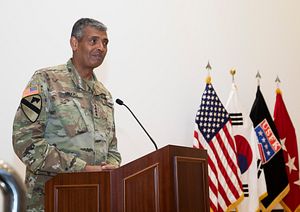U.S. Forces Korea (USFK), the joint headquarters for the U.S. armed presence in South Korea, will see a change in leadership soon. U.S. Army General Vincent K. Brooks, who has commanded USFK since April 2016, will step down. His successor is likely to be General Robert B. Abrams, currently the commander of the U.S. Army Forces Command.
Abrams will sit before the U.S. Senate Armed Services Committee later this month, on September 25, for a confirmation hearing. He has long been expected to succeed Brooks as the commander of USFK, barring temporary rumors that U.S. President Donald J. Trump’s former advisor on national security affairs, Lieutenant General H.R. McMaster, may have succeeded Brooks in the USFK commander role.
Abrams has spent more than 30 years on active duty and is the son of General Creighton W. Abrams Jr., a Korean War veteran, a commander of U.S. forces in Vietnam, and a former Army chief of staff.
Abrams will inherit command of U.S. Forces Korea at a time of potential flux in the alliance as both South Korea and the United States engage in a new round of diplomacy with North Korea, aimed at improving relations and dealing with the longstanding issue of Pyongyang’s nuclear arsenal.
This year, the alliance suspended its annual early-autumn Ulchi-Freedom Guardian computerized command post exercises. If relations with North Korea remain on track, the alliance may suspend or serious modify the 2019 springtime Key Resolve and Foal Eagle exercises as well, which North Korea has criticized for years as a ruse by the alliance to stage an invasion.
Brooks’ tenure as USFK commander coincided with one of the most dramatic missile and nuclear-testing campaigns from North Korea under Kim Jong Un. Brooks led USFK as North Korea tested two nuclear weapons and, for the first time, successfully tested an intercontinental-range ballistic missile.
“North Korea remains a significant threat to security and stability in Northeast Asia and beyond,” Brooks testified before the Senate Armed Services Committee in March 2018, days after Trump had accepted an invitation from Kim Jong Un to meet in a summit setting.
“The Kim Jong Un regime continues to hold security and stability in the Indo-Pacific at risk with its conventional arms and further development of WMD and other asymmetric capabilities capable of posing a direct threat to the U.S. homeland.”
Under Brooks, USFK also relocated its headquarters from the Yongsan neighborhood of Seoul, in the heart of the South Korean capital, to Camp Humphreys in Pyeongtaek. The transfer happened earlier this summer.
The commander of USFK concurrently leads the United Nations Command in Korea and the South Korea-U.S. Combined Forces Command. The average tenure of a USFK commander is on the order of two-to-three years.

































